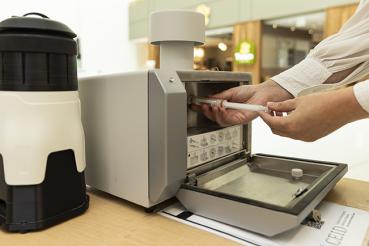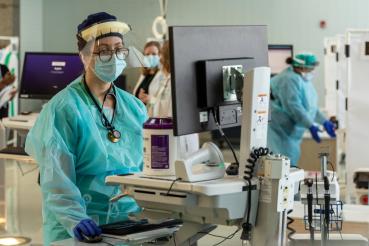With Chicago and Illinois seeing a surge in cases of COVID-19 and the city and state implementing new restrictions to lessen the spread of the disease, Rush University System for Health is preparing for a resurgence of cases. Rush will continue to diligently prepare and plan its response to the surge to ensure the safety of everyone in Rush hospitals and clinics and within the Rush community.
At Rush University Medical Center and across the Rush system, there has been a small increase in the number of patients hospitalized with COVID-19 so far, but it has not translated to an increase in mortality rates. Many of the new cases are in young adults who are less likely to develop severe symptoms and are able to recover at home.
“While we are cautiously optimistic that we will not experience the same high numbers of hospitalized patients that we experienced in the spring we are prepared for that scenario,” said Dr. Paul Casey, chief medical officer at Rush University Medical Center. “Our concern is patients will defer routine care which can be detrimental to one’s health so we are planning to remain open for all procedures, surgeries and appointments in order to care for all of our patients’ needs.”
In the face of adversity, Rush set the standard for COVID-19 care and received national recognition for its preparedness. In spring 2020, Rush was able to successfully care for the sickest COVID-19 patients, receiving hundreds of transfers from other hospitals that couldn’t provide the care patients needed, while maintaining safe and excellent care for the vast majority of patients who sought treatment from Rush for other medical conditions.
Even when positivity rates of COVID-19 tests began to fall, Rush leaders continued to meet to discuss what the future could bring. Because of this dedication to planning for the unknown, Rush has been able to ramp up its COVID-19 testing — the System has tested more than 90,000 people to date — and maintain a healthy level of personal protective equipment for staff, patients and visitors alike.
As a participant in multiple clinical trials, Rush has learned a significant amount about the most effective treatment for COVID-19. The development of the Illinois Department of Public Health’s resurgence plan has provided better regional tracking of cases and mitigation steps. In addition, Rush has helped hospitals throughout both the city and the country to be more prepared to care for patients with COVID-19.
“We know Rush is the place where people will come when they run out of options. Be assured that Rush will forever stand with patients in need,” said Dr. Omar Lateef, CEO of Rush University Medical Center. “We provide care safely for the vast majority of our patients who have conditions other than COVID-19 while also treating patients with the disease. We plan to continue to do so — offering the procedures, surgeries and all of the excellent care that our patients need.”
“Fortunately, we are in a very different place now compared to our initial surge in cases more than six months ago,” added Angelique Richard, PhD, RN, CENP, chief nursing officer, Rush University System for Health and Rush University Medical Center, and senior vice president of hospital operations, Rush University Medical Center. “COVID-19 testing is much more widely available, which not only contributes to the increase in reported cases, but also means people diagnosed with COVID-19 can take necessary precautions to prevent further spread.”
While Casey, Richard and the rest of Rush’s leadership team are planning for a challenging winter, Casey says basic common-sense public health approaches can make a big difference in reducing the impact of this second surge. Frequent hand washing, adhering to universal masking guidelines and social distancing are all scientifically proven methods to prevent the spread of COVID-19. Staying home this winter also can greatly reduce your risk and the risk of infecting others.
“COVID-19 is among the greatest challenges Rush and the world have faced. We will get through this, because everyone at Rush has been exceptional, collaborative and resilient,” Casey said. “When this challenge is behind us, and it will be, we will look back on it with immense pride at what we have done to save lives, improve health and protect our community.”




